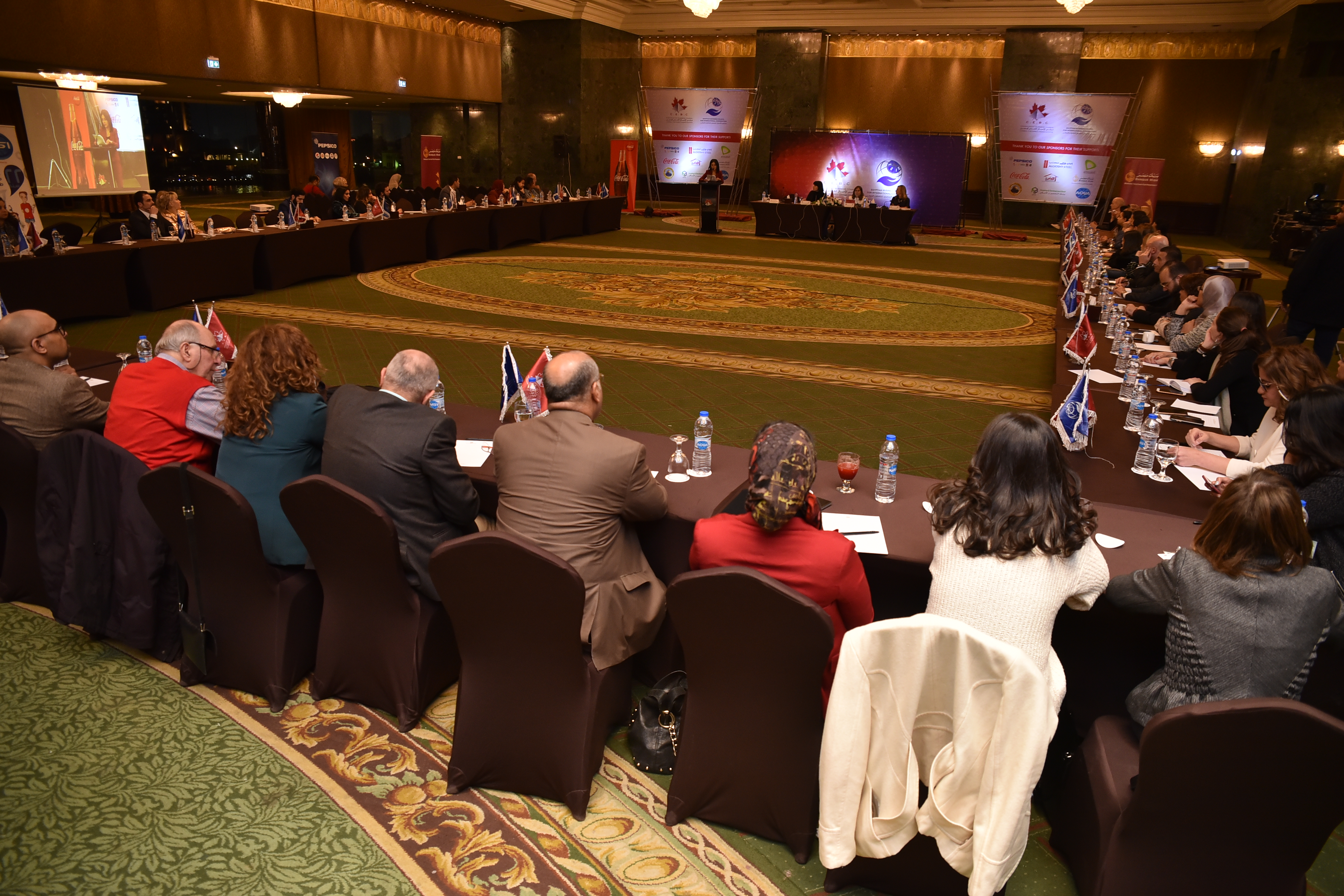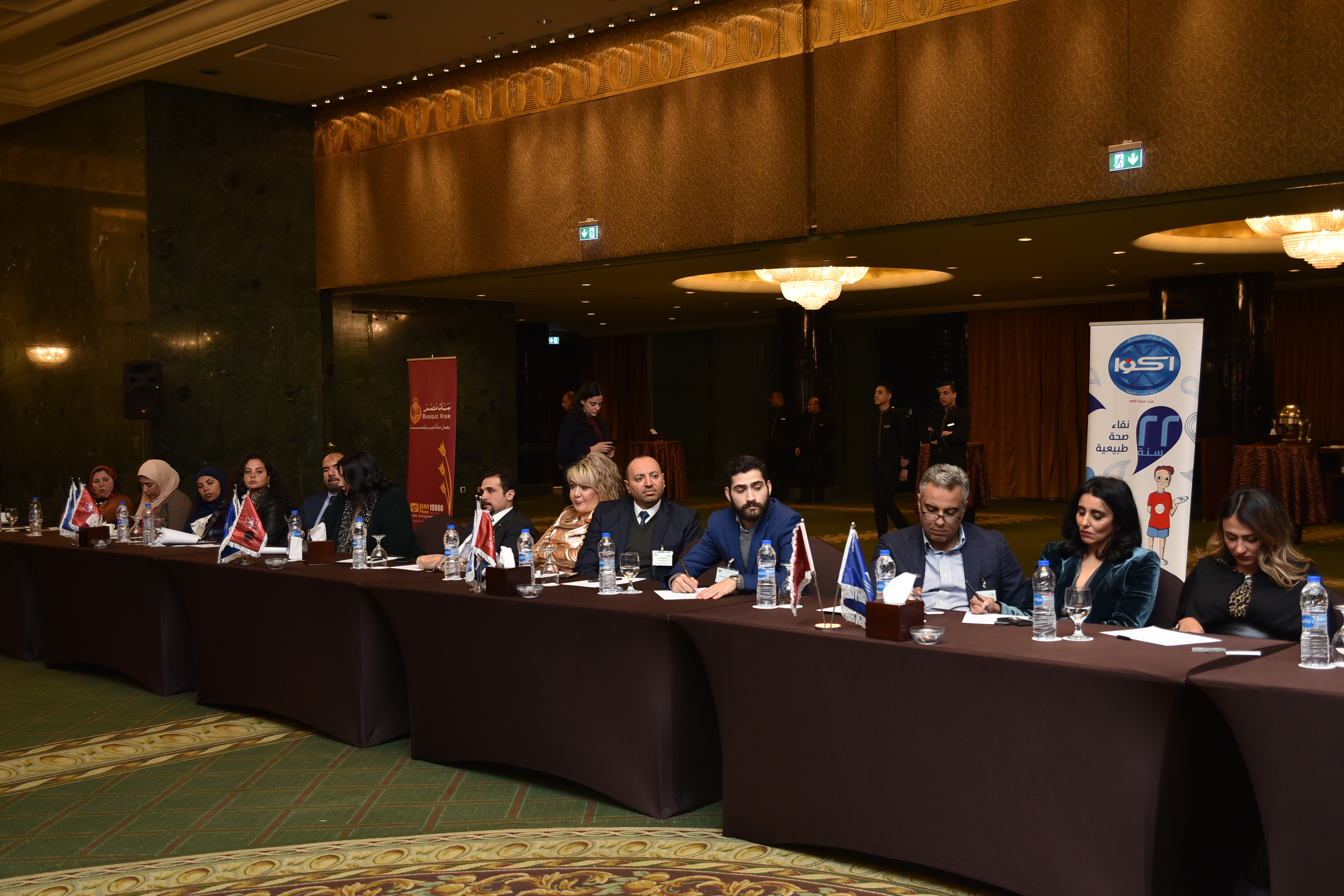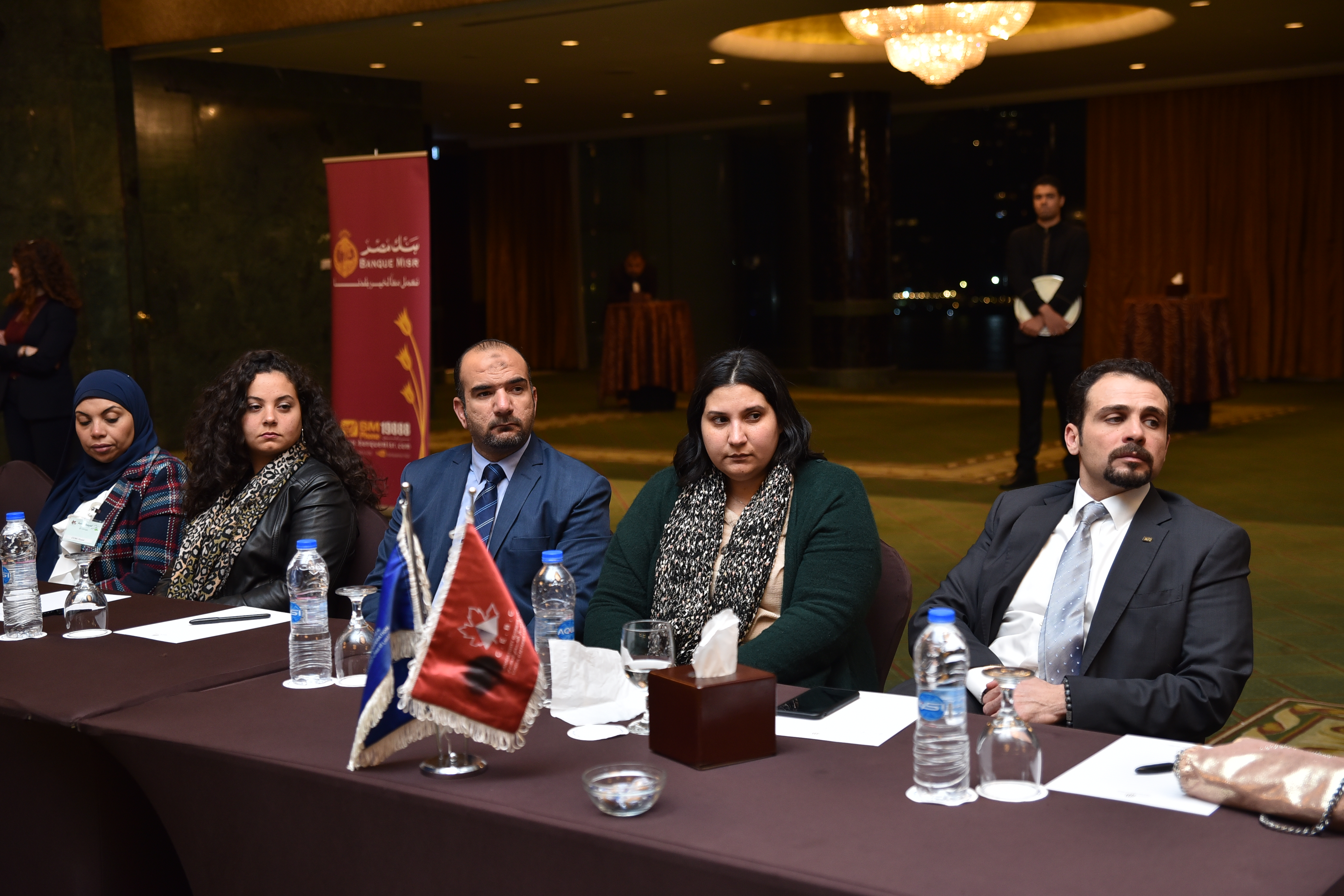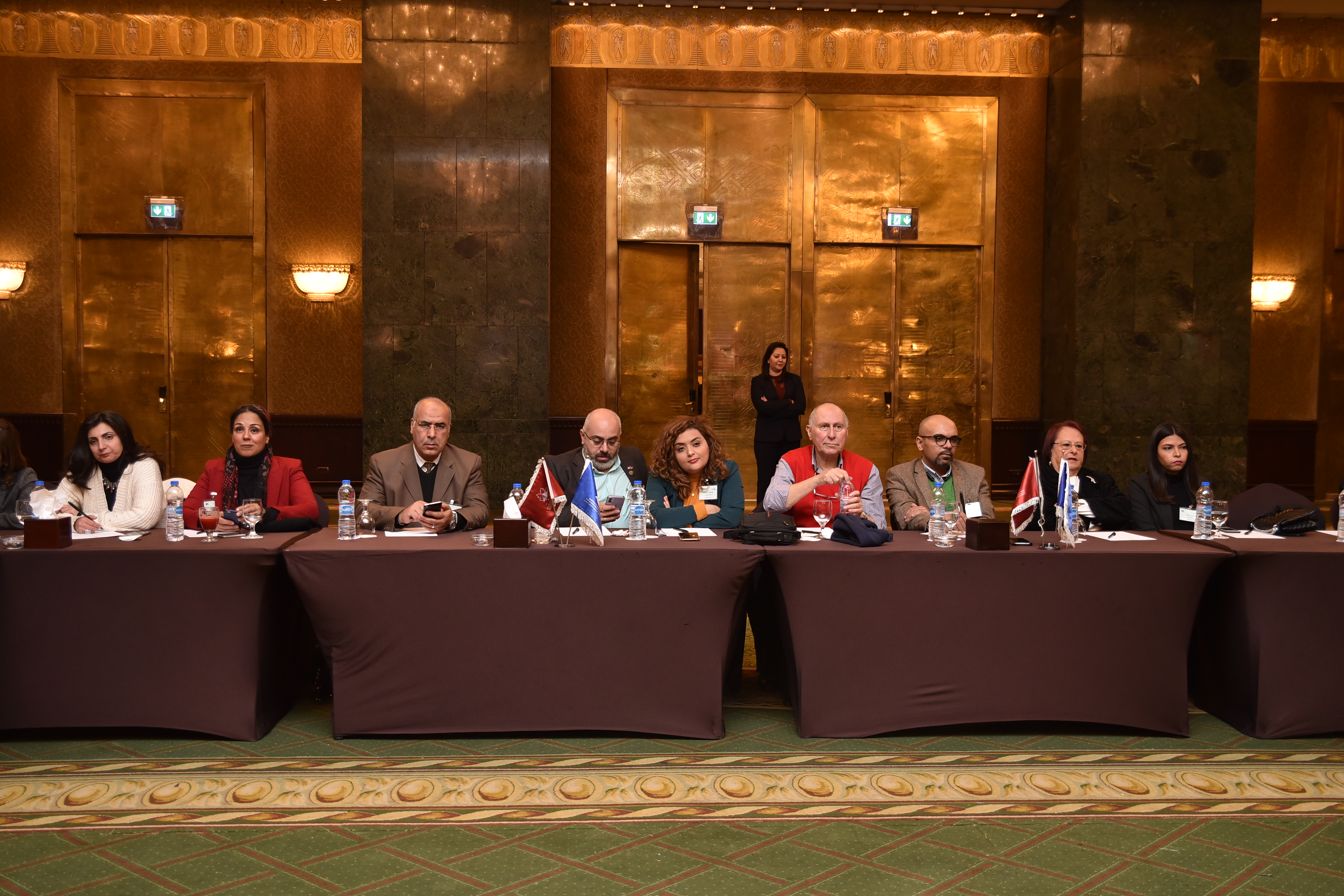
Date
Speaker(s)
Invitation
Description
“Women’s Economic Empowerment for Inclusive and Sustainable Growth”
Did you know that women’s unemployment is more than three times that of men?
The Canadian government in partnership with UN Women & the UNIDO initiated a project that aims to support women’s economic empowerment in Egypt; helping to create jobs by improving the business enabling environment and promoting a culture of entrepreneurship for women in high growth sectors such as agribusiness and energy.
On Behalf of CEBC & ECIC; Ms. Rania Wagdy – Executive Director welcomed our distinguished Speakers of the roundtable discussion: Ms. Hanaa El-Helaly; Executive Advisor to the Chairman – EALB Head of the International Cooperation Committee – CEBC, Ms. Gielan Elmessiri; Deputy Country Representative; UN Women – Egypt Country Office, Ms. Annachiara Scandone; Business Development Specialist – UNIDO Regional Office in Egypt. Also thanked all distinguished guests that joined this Important Discussion.
Ms. Rania Wagdy in the opening remarks; highlighted that the forum today comes within the framework of the Council’s strategy in which includes participating actively in supporting various economic initiatives & activities. Economic Empowerment for women; is an issue that is now receiving a great attention from the political leadership & government; given that women are essential partner in Egypt’s plan for development & achieving sustainable growth. Recently women have received unprecedented attention in the last years since the beginning of the Egyptian President Abdel Fattah El SiSi took over; as he supported the empowerment of women in all fields, where Egypt’s vision for 2030 is to pay attention to the role of women as the national strategy has been launched to empower women in 2017. In addition to the above the declaration of his Excellency that 2017 was the kickoff of Egyptian women; as he increased the number of female ministers in the government to 8 besides an increase in women’s participation in the parliament to reach 15% compared to 2% in 2012. The Government also adopted many initiatives & efforts such as the Loans of the project development authority granted for women who exceeded 50% as well as the women with bank accounts from 9% in 2015 to more than 27% currently. And this will reflect in increasing opportunities for Egyptian women to penetrate the market in different sectors. The results of these efforts will ultimately elevate Egypt & achieve economic empowerment of women in achieving the sustainable development which includes a drastic focus of reducing the unemployment rate for women that goes for 2030. We hope that the maximum number of Egyptian women will benefit from this project and to contribute successfully in helping them to face challenges & to start entrepreneurships in opening new doors of livelihood & hope for many women.
Ms. Hanaa El-Helaly thanked the distinguished Speakers & Attendees for being here & was delighted to be with CEBC & ECIC to discuss this essential topic “Women’s Economic Empowerment” and apologized on behalf of Ms. Eman Omran; the God father of this project, saying that Women’s Economic empowerment is a cross cutting function & a very important tool when it comes to implementation of strategies; like poverty decent jobs… etc. She highlighted that this project is funded from the Canadian Government with the budget of 9 million dollars which aims to support women’s economic empowerment in Egypt. This project will help creating job opportunities by improving the businesses, enabling environment & promoting a cultural of entrepreneurships & increase its rate. The importance of entrepreneurship when it comes to SMEs, actually she shared with CEBC & ECIC SMEs committee as we strongly believe that women play in entrepreneurship & becoming a future business women as well as increasing the presence of women in hydro sectors such as agribusiness & energy. She added that this project is implemented by UN women & UNIDO the United Nations industrializations development Organization. Finally she introduced the distinguished Speakers Ms. Gielan & Ms. Annachiara asking them to share with the audience their scope of work in this essential Project.
Ms. Gielan Elmessiri; she thanked CEBC & Ms. Hanaa for initiating this event and the government of Canada for their generous contribution to this program & showed her gratitude to be with this extraordinary group of women & men; she was delighted that there is a nice turnout & an interest from the men champions participating in this discussion. She pointed out that the UN Egypt hosts 20 UN agencies that are present in Egypt each has a different scope of work, a different size and a different out reach. The organization she represents is the Unites Nations Entity for Gender Equality Empowerment Women (UN Women); it isThe UN Entity that is dedicated exclusively to gender equality & empowerment of women; it was established to accelerate progress on meeting the needs of women & girls worldwide, UN women has contributed to the increase to visibility & awareness of gender issues & global policy through the advocacy efforts, extensive aligns, partnership building, proactive outreach efforts & other needs. UN Women a program called triple Mandate; a mandate on the normative side, a mandate to coordinate & a mandate in terms of operation or programmatic activities. In the normative area; this is where UN women support member states for instance in this situation Egypt, in order to set global norms & standards for achieving gender equality & women’s empowerment. These commitments offer the basis for actions by government & other stakeholders to achieve gender equality & women empowerment at the global, regional & national levels through the adoption of laws, policies & programs. The main intergovernmental forum in UN women is the UN commission on the status of women & called CSW; it is the principle global intergovernmental body in the world that considers matters affecting women & girls & it meets every year in March; this is an example how global standards settings take place in UN women.
We also have CEDAW; a conventional on the elimination of all forms of discrimination against women that ratifies 189 Member State. Egypt was one the first countries ratified in CEDAW in 1981, once it is ratified by a government fulfilled with conventions & permissions it becomes in state of obligations under international law.
Another key global policy documents of gender equality women’s empowerment which is very important as part of women’s standard & normative work is the Beijing declaration & platform for action, which was adopted by again 189 countries in 1995 & in such a strategic objective & actions in 12 protocols areas of concern covering poverty, education, health violence, women & other areas.
There is set of international commitments related to gender equality; the New 2030 Agenda for sustainable development; it was adopted in September 2015 by UN General Assembly as a global framework to achieve peace, prosperity & partnership for the people & the planet & promises to leave no one behind. The 2030 agenda comprises 17 Sustainable Development goals SDGs which will determine through a global consultation; it is member states that have decided those goals that we need to achieve by the year 2030. The consultations spent 3 years in 193 countries, 8 million people & thousands of organizations, businesses & institutions. There was a dedicated goal on women’s empowerment & gender equality which is SDG 5; however gender equality is a crosscutting issue in almost all of the goals. As mentioned also women has a mandate to coordinate among the UN organizations in Egypt related to general issues & to make sure that these organizations promote actively gender equality, gender analysis, and gender mainstreaming.
On the operational side UN Women works in Egypt in four areas:
- Participation in government system; enabling & providing women to have ID cards to be able to access any governmental services, open bank accounts as they didn’t have any access.
- Income security, decent work & economic autonomy; the main goal is to put money in women’s hands by supporting women saving groups “جمعية” where women are able to save & lend out money with an interest rate set among themselves so, there is a bit more high profit margin, reaching out for now 25 thousand women that have established those groups as well as adding individual financial & financial technology through mobile wallets.
- All women & girls live a life free from violence; for instance value change in agribusiness sector & with the engagement of CSR, they transported them in unsafe ways like trucks, there is no investment or any type of health or fixed contracts so companies invested in training them but they don’t come back but now providing a more safe environment free of harassment will make them commit to their jobs.
- Building sustainable peace & resilience;
- By supporting clusters of scale women entrepreneurs like in Beni Suef; we established a program where a lot of women had a cow & the milk they had was either wasted or cheated by middle men in terms of pricing so, we partnered with a company “Done” & established a milk collection center (NGO) & now women are able to bring whatever excess milk they have to the center & sell it at market rates & in exchange they get training on milk hygiene & processing, also in Behera; we did the same but in “خرشوف” depending on what that particular governed specialized in.
- Another major area of programing for UN Women is related to ending violence against women; it’s a silent epidemic as it’s a global, regional & national problem; there is no country that doesn’t have this major pervasive problem we do a lot of work around intimate partner violence for instance with the ministry social solidarity; there are shelters for women that the government has established so, we worked a lot around upgrading & in renovating those shelters to be deigned in a way that provides space that is more confidential for women. And also trained many of the staff in those shelters to be able to deal with women in a more professional manner because there’s a lot of stereotypes & biases by forming regulations & we worked with the Public Prosecution as it is an essential link when it comes justice that type of sexual assault or crimes that happen; they investigates those crimes & are able to talk about it in a sensitive way that doesn’t subject women to double victimization by training them in sensitization around how to conduct or how to do prosecution that is sensitive & attentive to women’s concerns.
Ms. Annachiara Scandone; she was glad to join the line & thanked CEBC & Ms. Hanaa for having here to host this important discussion & thanked all attendees for making it here, saying that her task is easier to accomplish as Ms. Gielan mentioned many things that she can skip.
First of all UNIDO is a Specialized agency of the UN that promotes Inclusive & Sustainable industrial development; Inclusive means that we want an industrial development that includes all startups society & economy as well as industrial development that is sustainable which means it does not come at expensive environment. We support government in which we operate through 4 strategic priorities:
- Creating shared property.
- Advancing economic competitiveness.
- Safe garden environment.
- Transferring knowledge institutions.
In which it means supporting young entrepreneurs, SMEs, value change & clusters, agribusiness, textile, energy, waste management sectors & all the sectors that are priority for the government. We operate in supporting the greening of existing industries & the creation of new green industries by promoting new renewable sources of energy as compared to traditional & empowering women & youth. We also support countries as we do here in Egypt providing the assistance for development course as Ms. Gielan mentioned. It is important for UNIDO advancing progress on SDG 9 which calls to build or reset infrastructure, promote inclusive, sustainable industrial development & innovation. The real nature of the SDG’s is that they are highly interlinked so, while we’re doing industrial development we actually work on support the achievement of a lot of other SDGs; such as SDGs related to clean energy to women empowerment to sustainable consumption & production, decent jobs… etc.
Now how gender equality & women empowerment function to achieve inclusive & sustainable industrial development; as it is not important from the perspective of social equity of women’s right but it’s a matter of economic value outed as economies grow faster if women are engaged in the labor force as much as men. We’ll put here a clear business case for greater gender diversity in cooperate courts both form a micro economic perspective meaning in terms of individual company’s performance and also in terms of macroeconomic perspective in terms of high sustainable rate of economic growth. Basically make business & economic sense to invest in gender equality & empowerment of women. The magnitude of the type of opportunity that gender equality & women empowerment represents; globally it’s been estimated that GDP could increase by more than 25% if women played the same role in the market as men.
In Egypt we have similar statistics from the World Bank; saying that addressing women’s under representation in higher value operations could reduce the gap & boost workers output by 3 to 25%.
Basically it’s about leveraging a larger talent pool, leveraging the talent of women as employees as well as innovators & entrepreneurs to really boost Egypt’s economic growth.
Total manufacturing employment is increasing as well as the share of female manufacturing employees over the last decade yet there is still a significant gap between the share of manufacturing it total employment & the share of manufacturing female employment; manufacturing accounts for 12% of employment & manufacturing female employment only accounts 6% in Egypt, which is very low in both compared to Turkey, Tunisia, Morocco & Jordan they are very much higher manufacturing employment & they also have higher manufacturing employment for women for example Turkey is at 14%, Tunisia 32%, Morocco 11% where Egypt is only 6% at the moment so, if we really want women to lead & participate we need targeted gender actions, investments, policies & gender responsible.
Now UNIDO programs on the ground in our business development & entrepreneurship support programs; we competitively select entrepreneurs but without any preference towards women, at the end its only 10%of the whole pool of businesses entrepreneurs being women so, we need to design interventions as development partners & investments from private sectors & form policies from government that are gender targeted & that are gender specific. Now we are in the middle of a new industrial revolution, which is the fourth industrial revolution. We have come through three. This fourth represents some opportunities for advancing gender equality & economic empowerment for example in terms of decreasing the gender digital divide in engineering in ICT in providing technology driven solutions to all problems; solutions to women’s participation in the economy.













